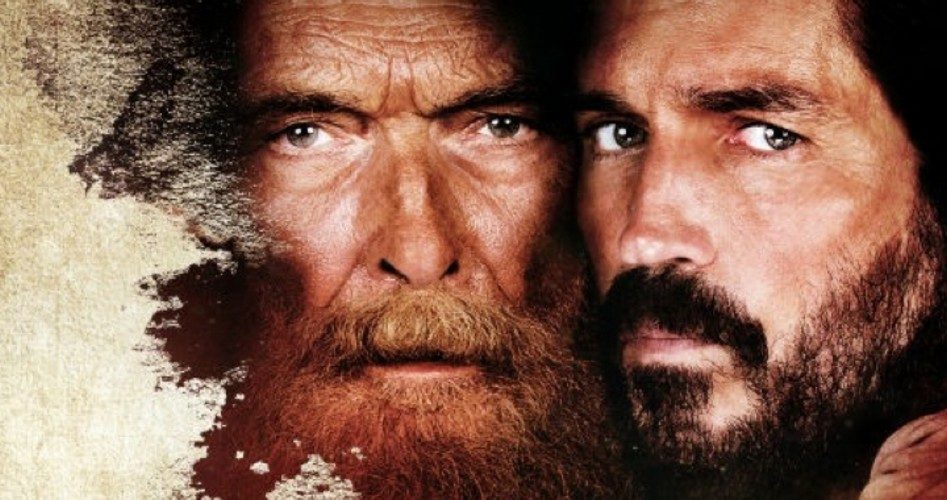
Today, Christians are often amazed at the hostility of the non-believing culture. This movie is a powerful demonstration of what can happen when that hostility is empowered with the sword of the State.
Perhaps no person other than Jesus Christ Himself is as important in Christian history than the Apostle Paul. Despite its title, this movie dramatizes little of the life of the great apostle, except for some flashbacks to what is probably the most famous conversion in history, when Paul met Jesus on the road to Damascus.
The film opens in Rome in A.D. 67, with Christians under horrific persecution in the Empire’s capital, having been blamed for the Great Fire of Rome by the Emperor Nero. Christians are being burned as Roman Candles along the streets. Others are being sent to face the lions in the arena. Paul’s friends, Aquilla and Priscilla (played by John Lynch and Joanne Whalley), are the leaders of “the Way,” as the Christian community was often called. Paul has been arrested and detained in Mamertine Prison, awaiting execution. Although the movie is titled Paul, Apostle of Christ, the story focuses upon “the beloved physician” and longtime companion of Paul, Luke (played by Jim Caviezel, who played the role of Jesus in Mel Gibson’s The Passion of the Christ). He has come to see Paul (played by James Faulkner) and hopefully garner some wisdom for the suffering Christian community in Rome.
He is able to visit Paul in the confines of the prison because of some unnamed powerful “friends.” While visiting with the condemned apostle, Luke secures no great advice from him on the question the Christians are asking: Should we flee Rome or stay? But, he does begin to take notes from Paul on his perspective on the spread of Christianity as a small sect within Judaism to an international faith that has now reached the capital of the Empire. These notes will later be used to write the biblical book we know as The Acts of the Apostles.
While the actual Book of Acts ends with Paul’s first imprisonment in Rome, a few years earlier, the movie passes over this by Luke telling Paul that he saw no reason to include the events since Paul’s release and second arrest and imprisonment. (This was one part of the film that I saw as somewhat contrived.)
Another important character in the movie is the Roman officer in charge of the prison, Mauritius Gallus (played by Olivier Martinez). He represents the pagan world confronted by Paul’s message, and despite his role in persecuting the great apostle, he is portrayed as conflicted. No explicit miracles are to be found in the movie, but Luke, using his skills as a physician, is able to save the life of Gallus’ very ill daughter, after Gallus’ own Roman physicians and his Roman gods have failed him. Earlier, Gallus had entertained the idea of praying to the Christian God, but Paul could give him no assurance that his daughter would be healed in response, so he did not even try.
Despite his daughter’s near-miraculous recovery, Gallus does not entertain the possibility of converting to the God of Paul and Luke. It is clear, however, that he does not like Nero, believing he has ruined Rome. He tells Luke, “I am sorry for Nero’s circus [where Christians are fed to the lions]. I am sorry your people who died today.”
A sub-plot in the movie is the struggle of Christians as how best to respond to a tyrant such as Nero. Even Luke wavers, expressing sympathy for those who wish to take up arms. In a scene that could be speaking of modern America, Luke condemns the Roman society as one wherein a baby born with the slightest defect is killed — in America technology has enabled such “defects” to be detected in the womb, often leading to abortion. Yet, Paul opposes armed rebellion by Christians against the Roman state.
Before Paul’s execution, he writes a letter to his beloved disciple, Timothy, who is the principal leader of the Christians in Ephesus, located hundreds of miles east, in Asia Minor (modern Turkey). At that time, the Christians in Ephesus were not having to contend with persecution from the Romans. That would come later, around A.D. 95, under the Emperor Domitian, and was the occasion of the writing of the Book of Revelation by the Apostle John.
In this letter to Timothy, considered by biblical scholars as his last epistle known as Second Timothy, Paul, expecting to face the swordsman at any time, told Timothy, “For I am already being poured out as a drink offering, and the time of my departure is at hand. I have fought the good fight. I have finished the race, I have kept the faith.” In a word of encouragement to those Christians suffering persecution, and for those who would face such in the future (as the Ephesians would), Paul added, “Finally, there is laid up for me the crown of righteousness, which the Lord, the righteous Judge, will give to me on that Day, and not to me only but also to all who have loved His appearing.”
Not surprisingly, many will not love His “appearing,” and there are critics who did not like this movie. Variety, for example, noting the movie’s emphasis on the persecution of Christians, was able to work in supposed sins of then-future Christians involved in the Crusades and the Inquisition. While it is not unexpected that secular critics have panned the movie (as they generally do Christian-oriented motion pictures), it is expected to reach a large, more appreciative, audience.
This movie shows the triumph of Christians, not in this life, but in the hope of eternal life. Much of the movie is dark (there is not a lot of light in an underground prison), because this is the reality of the time in which Christianity was the enemy of the State. The movie wrestles with the question as to how Christians should relate to a government led by an evil tyrant, such as Nero. As Christians were conflicted on this issue in the first century, it is a source of dispute among Christians today, as well.
Yet the movie should offer today’s Christians great hope. Despite the horrific persecutions depicted in the movie, Christianity not only survived but flourished. Why shouldn’t the Christians of today, many of whom live in lands where they do not have to fear for their lives by openly practicing their faith, be able to do the same?
Photo: http://www.paulmovie.com/



